How are the rules of etiquette or customs different in Panama?
Bill Hamilton - Bill Hamilton
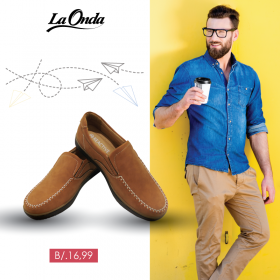 The Panamanians can be very formal in many ways. For instance if you are going to a government office for say, your resident permit then you must always wear appropriate clothing. Men, long trousers and a shirt with proper shoes. Women should wear a dress, trousers, skirt or blouse with proper shoes. The top clothing should cover properly. If this is not respected then you will not be permitted to enter. When Panamanians go to a restaurant for dinner the men always wear long trousers...
The Panamanians can be very formal in many ways. For instance if you are going to a government office for say, your resident permit then you must always wear appropriate clothing. Men, long trousers and a shirt with proper shoes. Women should wear a dress, trousers, skirt or blouse with proper shoes. The top clothing should cover properly. If this is not respected then you will not be permitted to enter. When Panamanians go to a restaurant for dinner the men always wear long trousers... The Panamanians can be very formal in many ways. For instance if you are going to a government office for say, your resident permit then you must always wear appropriate clothing. Men, long trousers and a shirt with proper shoes. Women should wear a dress, trousers, skirt or blouse with proper shoes. The top clothing should cover properly. If this is not respected then you will not be permitted to enter. When Panamanians go to a restaurant for dinner the men always wear long trousers and a shirt and the ladies tend to dress smartly. Similar to Spain. As opposed to Spain there is also great use of the word Usted (you) instead of Tu which is now common in Spain. Usted being a formal manner of address and (you) Tu being familiar. Also Hola (hello) is not used as much as Spain being, again informal so it is usually Buenas, buenas dias, buenas tardes etc.
The Panamanians can be very formal in many ways. For instance if you are going to a government office for say, your resident permit then you must always wear appropriate clothing. Men, long trousers and a shirt with proper shoes. Women should wear a dress, trousers, skirt or blouse with proper shoes. The top clothing should cover properly. If this is not respected then you will not be permitted to enter. When Panamanians go to a restaurant for dinner the men always wear long trousers and a shirt and the ladies tend to dress smartly. Similar to Spain. As opposed to Spain there is also great use of the word Usted (you) instead of Tu which is now common in Spain. Usted being a formal manner of address and (you) Tu being familiar. Also Hola (hello) is not used as much as Spain being, again informal so it is usually Buenas, buenas dias, buenas tardes etc. Equal to hello, good day, morning etc. Another nice thing with the Spanish based culture is that you will often have someone enter a restaurant and when passing your table say "Buen Proveche" equivalent to "Enjoy your meal."
(Ad for men's clothing at lA Onda, Panama City, Panama, pictured.)
Posted March 30, 2013
Chris Frochaux - Chris Frochaux - SERVMOR REALTY
After living in Panama for about 17 years, I would not regard Panamanians as overly formal. The dress code is pretty relaxed. However it varies according to the circumstances. Would you go to the beach in a tuxedo? Would you attend a church service wearing shorts? It's not just the Panamanians! You simply dress differently when you are in the city and when you are at the beach. The same Panamanian attorney who feels compelled to wear his trademark suit and tie all week is happy...
After living in Panama for about 17 years, I would not regard Panamanians as overly formal. The dress code is pretty relaxed. However it varies according to the circumstances. Would you go to the beach in a tuxedo? Would you attend a church service wearing shorts? It's not just the Panamanians! You simply dress differently when you are in the city and when you are at the beach. The same Panamanian attorney who feels compelled to wear his trademark suit and tie all week is happy to wear shorts and beach shoes during the weekend. The dress code is not formal... it's simply appropriate. Please keep in mind that Hawaiian shirt, shorts and flip-flops are not mandatory for visitors.
Panamanians are said to be "igualados", meaning they consider themselves to be on the same level as their interlocutor. That proud attitude is not conducive to superlative customer service... Conversely, a condescending attitude will take you nowhere fast. If you talk down to them, expect them to talk back. They are a genuinely warm and friendly people and their attitude will reflect yours. If you are prone to complaining all the time, they'll provide you with plenty of opportunities.
Panamanians have a great sense of humor, but irony is not well appreciated. Avoid sarcasm at any cost, as it is considered offensive. Generally speaking, check your customs at the door, and get ready to experience theirs. This is what travel is about. Be a traveler, not a tourist.
Posted April 26, 2013
David Whittington - Tucan Golf Club and Resort
The first thing that comes to mind regarding how etiquette and customs are different in Panama than in Canada are that, in Panama City, the drivers are, from a Canadian perspective, maniacs.
Relative to business, Panamanians are rarely on time. You can have a meeting set up for 10 AM, and they’ll call around 11:30 and tell you they’re not going to be able to make it. In general, Panamanians don’t feel a necessity to be punctual. They’re...
Relative to business, Panamanians are rarely on time. You can have a meeting set up for 10 AM, and they’ll call around 11:30 and tell you they’re not going to be able to make it. In general, Panamanians don’t feel a necessity to be punctual. They’re...
The first thing that comes to mind regarding how etiquette and customs are different in Panama than in Canada are that, in Panama City, the drivers are, from a Canadian perspective, maniacs.
Relative to business, Panamanians are rarely on time. You can have a meeting set up for 10 AM, and they’ll call around 11:30 and tell you they’re not going to be able to make it. In general, Panamanians don’t feel a necessity to be punctual. They’re very laid back here. In North America, we try to be on time and call if we’re going to be late. Here in Panama, however, it happens quite a bit that you’ll wait for someone to show up and they won’t. Later, they’ll just tell you they were busy.
When you’re dealing with someone on a face-to-face basis, the way you do business in Panama is similar to how you would do it in North America, with the exception that there will be less than 50% chance that they’ll show up on time.
From a personal perspective, our experiences here with local Panamanians have been mainly with people we’ve met through golf. Anybody who can afford to golf in Panama is a professional. In Panama, most professionals are educated, they speak English, and many have gone to school in the US, so their attitudes are quite a bit more like North Americans than the lower income Panamanians, who, in contrast, have been locally educated, and with a less professional job.
Many upper income Panamanians send their children to boarding schools, many times in the US. These people have a different attitude compared with the average Panamanian—more similar to North Americans. They’ll be more likely to be on time, phone you if they’re late, leave messages, that type of thing.
Relative to business, Panamanians are rarely on time. You can have a meeting set up for 10 AM, and they’ll call around 11:30 and tell you they’re not going to be able to make it. In general, Panamanians don’t feel a necessity to be punctual. They’re very laid back here. In North America, we try to be on time and call if we’re going to be late. Here in Panama, however, it happens quite a bit that you’ll wait for someone to show up and they won’t. Later, they’ll just tell you they were busy.
When you’re dealing with someone on a face-to-face basis, the way you do business in Panama is similar to how you would do it in North America, with the exception that there will be less than 50% chance that they’ll show up on time.
From a personal perspective, our experiences here with local Panamanians have been mainly with people we’ve met through golf. Anybody who can afford to golf in Panama is a professional. In Panama, most professionals are educated, they speak English, and many have gone to school in the US, so their attitudes are quite a bit more like North Americans than the lower income Panamanians, who, in contrast, have been locally educated, and with a less professional job.
Many upper income Panamanians send their children to boarding schools, many times in the US. These people have a different attitude compared with the average Panamanian—more similar to North Americans. They’ll be more likely to be on time, phone you if they’re late, leave messages, that type of thing.
Even the professionals, though, have a different attitude towards punctuality than North Americans. If a North American is in a meeting that’s running so late he’ll be two hours late for his or her next meeting, he or she will generally ask to be excused and call the people at the next meeting to let them know. In Panama, that generally doesn’t happen; you won’t get a call.
I recently asked a Panamanian lawyer who was extremely punctual, called back, left messages, etc., why he acted that way. His response was that he realized that if he wanted to keep his expat clients, he had to act like them.
Posted August 2, 2014
Frank Kehanu
International etiquette applies also in Panama, especially in highly educated and elite circles.
Also, as other places, Panamanians in general view kindness as weakness so being just cool (not going out of your way) does the trick.
International etiquette applies also in Panama, especially in highly educated and elite circles.
Also, as other places, Panamanians in general view kindness as weakness so being just cool (not going out of your way) does the trick.
Posted August 3, 2014
Rafael Alvarado - Rafael Alvarado / Attorney / Real Estate Broker
.jpg) In Panama, if you set a meeting at 8 PM, you will find it quite common for people to tell you that because of a traffic jam, they will arrive at your meeting place at least 30 minutes later. If the plumbers tell you that they are coming to fix your toilet, most likely, they would call you again to tell you that they could not make it because of a traffic jam. It is very common so you should be more patient.
In Panama, if you set a meeting at 8 PM, you will find it quite common for people to tell you that because of a traffic jam, they will arrive at your meeting place at least 30 minutes later. If the plumbers tell you that they are coming to fix your toilet, most likely, they would call you again to tell you that they could not make it because of a traffic jam. It is very common so you should be more patient. Traffic in Panama City if terrible and most...
.jpg) In Panama, if you set a meeting at 8 PM, you will find it quite common for people to tell you that because of a traffic jam, they will arrive at your meeting place at least 30 minutes later. If the plumbers tell you that they are coming to fix your toilet, most likely, they would call you again to tell you that they could not make it because of a traffic jam. It is very common so you should be more patient.
In Panama, if you set a meeting at 8 PM, you will find it quite common for people to tell you that because of a traffic jam, they will arrive at your meeting place at least 30 minutes later. If the plumbers tell you that they are coming to fix your toilet, most likely, they would call you again to tell you that they could not make it because of a traffic jam. It is very common so you should be more patient. Traffic in Panama City if terrible and most people use that as an excuse for being late. So the common practice here is to set a buffer against the exact meeting time. For example, if you are invited to a birthday party that starts at 10 AM, they would tell you that the party starts at 9 AM because they know that you would arrive at 10 AM.
Posted October 16, 2014
Lucia Haines - Panama Realtor Inc.
I have always considered Panama or Latin America in general to be more formal in terms of dress and in terms of etiquette than the United States, but with the growing tourism in Panama, Panamanians have become at lot more lax, mostly with the dress code, as well as with other items.
But still, when you go into government offices in Panama, you have to go with closed shoes and pants, and you have to go dressed a certain way; more conservatively. Banks in...
I have always considered Panama or Latin America in general to be more formal in terms of dress and in terms of etiquette than the United States, but with the growing tourism in Panama, Panamanians have become at lot more lax, mostly with the dress code, as well as with other items.
But still, when you go into government offices in Panama, you have to go with closed shoes and pants, and you have to go dressed a certain way; more conservatively. Banks in Panama have become more lax with regards to the dress code, but you still have to go dressed in a certain way to banks as well. It is slightly more formal, but nowhere like it used to be.
On a different subject, Latin Americans are not always very punctual. There are exceptions, but as a general rule, Panamanians operate on “Panama Time.”
Driving in Panama City creates its challenges. People are just a lot more assertive, and the traffic can be pretty hectic. I have heard there is some places in the States,like California, where the traffic can be pretty bad. But people are just more assertive here in Panama, and they tend to “talk more with their horns.” Strangely enough, even though we drive more agressively and we use our horns a lot, we do not have “road rage” here that I heard of from other areas.
Posted October 28, 2014
Antonio Cheng - Romero Realty
Panamanians have a fun way of telling time. For example, if we have a meeting, I will tell you that the meeting is at 12 noon "British time," which means that you have to be there at exactly 12 noon. If you say "Panamanian time," that would be 12:30 PM or maybe even 1:00 PM, because Panamanians are not punctual.
Panamanians do like to party and go out a lot. We also like to talk loud. That does not mean that we are rude, but we...
Panamanians have a fun way of telling time. For example, if we have a meeting, I will tell you that the meeting is at 12 noon "British time," which means that you have to be there at exactly 12 noon. If you say "Panamanian time," that would be 12:30 PM or maybe even 1:00 PM, because Panamanians are not punctual.
Panamanians do like to party and go out a lot. We also like to talk loud. That does not mean that we are rude, but we just like to talk loud.
The food here in Panama is also different. We like to eat a lot of rice, a lot of meat, and fried food.
Posted November 3, 2014
Gonzalo de la Guardia - Panasurance
When in Panama, you just have to be observant. Look around and do as people do. Basically, we have the same culture as the US; all you have to do is translate it. Panama is not like some people haven’t heard about Santa Clause because it is an entirely different culture. Here in Panama, we celebrate Thanksgiving, Halloween, Christmas, etc., so it is the same. However, you have to make the extra effort of translating into Spanish.
That's...
When in Panama, you just have to be observant. Look around and do as people do. Basically, we have the same culture as the US; all you have to do is translate it. Panama is not like some people haven’t heard about Santa Clause because it is an entirely different culture. Here in Panama, we celebrate Thanksgiving, Halloween, Christmas, etc., so it is the same. However, you have to make the extra effort of translating into Spanish.
That's what I did when I moved from Panama to the US. When we moved, my kids didn't speak English, but in a matter of six months, they became fluent in English. Then, to understand the culture in the US, all they had to do was translate Spanish into English, and everything else in the culture is the same.
Posted November 19, 2014
Robert Adams - Retirement Wave
There’s nothing dramatic in terms of different rules of etiquette or customs in Panama. Panamanians are more old-fashioned, so to speak. When you walk in an elevator, you say “Good morning” to everyone standing there and they say “Good morning” to you. There’s just more emphasis put on being polite in Panama as opposed to just ignoring people and living in your own little world when you travel alone. That surprises some people. I...
There’s nothing dramatic in terms of different rules of etiquette or customs in Panama. Panamanians are more old-fashioned, so to speak. When you walk in an elevator, you say “Good morning” to everyone standing there and they say “Good morning” to you. There’s just more emphasis put on being polite in Panama as opposed to just ignoring people and living in your own little world when you travel alone. That surprises some people. I figured that’s something you can get used to very quickly.
The customs aren’t really that different at all. For society as a whole, act in a polite and friendly manner and you will be just fine.
The customs aren’t really that different at all. For society as a whole, act in a polite and friendly manner and you will be just fine.
Posted November 22, 2014
Michael A. Martinez - B & B Real Estate Nicaragua / Panama Real Estate Information
.jpg) I think there is a lot of pride in the Latino person in general anywhere south of the border. Here in Panama, it is best not to offend anybody, but sometimes you may not know, for example, how much food they made, if they want to argue about something, or if they want to show you a project or some of their land or something that is dear to them. If you have the time, I suggest you go ahead and take the time to honor their wishes because I think they can be a little touchy when...
I think there is a lot of pride in the Latino person in general anywhere south of the border. Here in Panama, it is best not to offend anybody, but sometimes you may not know, for example, how much food they made, if they want to argue about something, or if they want to show you a project or some of their land or something that is dear to them. If you have the time, I suggest you go ahead and take the time to honor their wishes because I think they can be a little touchy when....jpg) I think there is a lot of pride in the Latino person in general anywhere south of the border. Here in Panama, it is best not to offend anybody, but sometimes you may not know, for example, how much food they made, if they want to argue about something, or if they want to show you a project or some of their land or something that is dear to them. If you have the time, I suggest you go ahead and take the time to honor their wishes because I think they can be a little touchy when they feel offended.
I think there is a lot of pride in the Latino person in general anywhere south of the border. Here in Panama, it is best not to offend anybody, but sometimes you may not know, for example, how much food they made, if they want to argue about something, or if they want to show you a project or some of their land or something that is dear to them. If you have the time, I suggest you go ahead and take the time to honor their wishes because I think they can be a little touchy when they feel offended. The Panamanian culture is a culture that waits, so they may like you to make the first step in terms of settling a dispute. It is best that we take one foot forward because they are not really good at that. It is difficult to offend them in this way.
Us Americans are used to walking around and even going to banks wearing shorts and flip flops. I know that in some nicer businesses, banks, and government offices, they feel offended if you come in wearing very casual clothing. Panamanians dress up to the tee. It doesn’t matter if they have the economic means or not. Even the poor Panamanians wear their best shoes. If they have their old pants, they will be nicely pressed. They wear pressed shirts. So I think sometimes they feel offended when foreigners come in wearing flip flops and shorts, and not shave and then go to a bank or come to a business seminar. Panamanians like doing business in business clothes and they act nicely. I think they are offended with gringos who do not respect that. That does not happen in the beach towns but when you go to town and you go to a bank, they will respect you more if you dressed up clean and nice.
(Panamanian foreign minister Francisco Alvares de Soto with Ecuadorian Foreign Minster Ricardo Patino wearing traditional guayabera shirts, pictured.)
Posted February 18, 2015
Lourdes Townshend
Etiquette and rules in Panamá
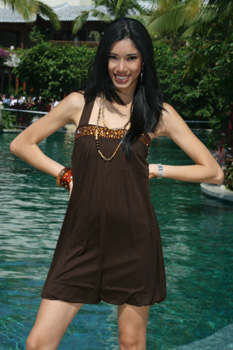 Panamá is unique when comes to etiquette and rules, in every way. And the reason is that since the 15th century, Panamá is, by excellence, the path of the "Américas" and to the world, a tradition that keeps until the present day, in the 21st century.
Panamá is unique when comes to etiquette and rules, in every way. And the reason is that since the 15th century, Panamá is, by excellence, the path of the "Américas" and to the world, a tradition that keeps until the present day, in the 21st century. Many foreigners consider the Panamanian and Latin women very beautiful. But, in all honesty, I can relate...
Etiquette and rules in Panamá
 Panamá is unique when comes to etiquette and rules, in every way. And the reason is that since the 15th century, Panamá is, by excellence, the path of the "Américas" and to the world, a tradition that keeps until the present day, in the 21st century.
Panamá is unique when comes to etiquette and rules, in every way. And the reason is that since the 15th century, Panamá is, by excellence, the path of the "Américas" and to the world, a tradition that keeps until the present day, in the 21st century. Many foreigners consider the Panamanian and Latin women very beautiful. But, in all honesty, I can relate that this is because they put a special "touch" in the way they dress, or make every move; very delicate, feminine and with a very special code of dress, always in style.
Panamanian, as well as all Latin American women, take pride in being gentle, and make their best effort to always look nice, especially in the afternoons, when very often they make plans to go out with their husband, friends or relatives. Even if they go only with their children, they also take care of their children's dress code.
Latin American people are very social and love parties. They don´t need any excuse to make one. If there is no reason, they invent one; but the idea is to have fun. No matter where they are-- in the city, country, mountain or beach, they always find a way to get together with neighbors and have good time.
Regarding different customs in Panamá, you may ask, "Compared to what?".
If you go to Europe, people are very culture- oriented and more formal. In Asia, they take extremely good care of their seniors. In Africa, tribes have their very own traditions based in the customs of their ancestry. In Oceania they have their very own way of life.
So, you ask. "What is it like in Panamá"?
Well, Panamá, as I said before, is unique. Their people are warm and caring. They will help you in any way they can, no matter if they know you or not, as long as you are not rude to them, and you make an effort to speak any word of their language. They will giggle and try to understand. This is especially true in the "interior" (or countryside), where more of the people are farmers, but also in all the modern resorts spread out through the country and in the expats communities.
In the city almost everyone speaks English, and the city is very modern and cosmopolitan. In the city you will find anything and everything, like a "mini New York City".
Yes, we do not expect to be a super city... there are some aspects to take in consideration, like sometimes, due to city budgets, garbage is not picked enough; or the streets are not signed the way they should be; or the traffic is heavy because of the numerous cars in the streets. But great things make Panamá great, like the very new "metro" in the city; our singular Panamá Canal (which is one of the Eight Wonders of the World); our beautiful train from Panamá to Colón, and wonderful fishing, water rafting, scuba diving and all kinds of outdoor adventure opportunities. Ahh... and what to say about our great abundance of birds, rainforests and plants, which are unique in the world?
Regarding folklore, Panamá has an enormous tradition of beauty and elegance. We have all kinds of dresses throughout the country, and a singular "pollera" (our national dress), that are handmade, and sometimes take up to three years to make, and for which, complete with jewelry, the price could go up to $20,000 (US dollars). And what about the beautiful congo dances in Colón? All that, because of the "crisol de razas" (crucible of races) that is Panamá. We have beautiful things brought from every corner of the world, just ready to share with our visitors.
(Shey Ling Him, Miss Panama 2007, pictured.)
Posted February 18, 2015
Jennifer Moloney Jones
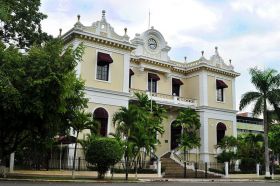 There are a lot of cool differences in etiquette and customs here in Panama. The one that comes to my mind immediately is that in restaurants, if you put your handbag on the floor, somebody will rush over to you, pick it up, and put it on a chair because it is considered bad luck to put your purse on the floor because your money will run away. It was something that actually shocked me when I first came here. I thought the person picking up my bag was trying to take it, but she...
There are a lot of cool differences in etiquette and customs here in Panama. The one that comes to my mind immediately is that in restaurants, if you put your handbag on the floor, somebody will rush over to you, pick it up, and put it on a chair because it is considered bad luck to put your purse on the floor because your money will run away. It was something that actually shocked me when I first came here. I thought the person picking up my bag was trying to take it, but she... There are a lot of cool differences in etiquette and customs here in Panama. The one that comes to my mind immediately is that in restaurants, if you put your handbag on the floor, somebody will rush over to you, pick it up, and put it on a chair because it is considered bad luck to put your purse on the floor because your money will run away. It was something that actually shocked me when I first came here. I thought the person picking up my bag was trying to take it, but she wasn’t. She was just trying to put in on a chair for me and told me that it is very bad luck to put my bag on the floor.
There are a lot of cool differences in etiquette and customs here in Panama. The one that comes to my mind immediately is that in restaurants, if you put your handbag on the floor, somebody will rush over to you, pick it up, and put it on a chair because it is considered bad luck to put your purse on the floor because your money will run away. It was something that actually shocked me when I first came here. I thought the person picking up my bag was trying to take it, but she wasn’t. She was just trying to put in on a chair for me and told me that it is very bad luck to put my bag on the floor. Another difference is in the way you dress. If you are doing something official, then gentlemen need to wear shirts and shoes; not flip flops or sandals. Preferably, they should also wear long trousers. If you are a woman, you need to keep your shoulders covered. It is actually a funny irony because you could go in a low cut blouse and a short skirt, but you have to have your shoulders covered. That is something that you need to know if you are moving here. They will not let you in government buildings, if you are not dressed appropriately.
(The Attorney General's office in Panama City, pictured.)
If you really want to see the different cultures Panama has, you have to go out and about and see all the different indigenous cultures. Go to the interior and see girls in polleras (their national clothing) and the men who sing folk music about everything in their culture. Panama has a very rich culture that has so many influences over the years. They have influences from the Caribbean, from the US, from the French, and Colombians. They just have so many influences that it shines through them. It is lovely.
If I were invited for dinner at a local Panamanian’s house, I would certainly bring some wine or anything appropriate to drink, but other than that, they wouldn’t expect you to act any differently at their house. I guess the only thing is you have to eat a lot. They would want you to eat a lot.
Posted March 12, 2015
Linda Jensen
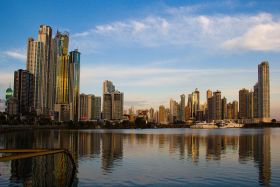 In Panama, there is usually an armed guard in front of every bank, important institutions, and government offices. If you are wearing a cap or a hat, the guard will ask you to remove it. If you have too many bags or anything too large, they will ask you to take it to a certain section and leave it there before you transact business. Banking institutions do not allow people in if they are dressed inappropriately. You are not allowed in if you are in ragged shorts, t-shirts that are...
In Panama, there is usually an armed guard in front of every bank, important institutions, and government offices. If you are wearing a cap or a hat, the guard will ask you to remove it. If you have too many bags or anything too large, they will ask you to take it to a certain section and leave it there before you transact business. Banking institutions do not allow people in if they are dressed inappropriately. You are not allowed in if you are in ragged shorts, t-shirts that are... In Panama, there is usually an armed guard in front of every bank, important institutions, and government offices. If you are wearing a cap or a hat, the guard will ask you to remove it. If you have too many bags or anything too large, they will ask you to take it to a certain section and leave it there before you transact business. Banking institutions do not allow people in if they are dressed inappropriately. You are not allowed in if you are in ragged shorts, t-shirts that are dirty, and things like that. They will not allow you inside a bank if you are wearing sunglasses, either. People from all walks of life here dress very cleanly when they go out. They try to dress the best they can afford. When they’re working, many of them wear uniforms.
In Panama, there is usually an armed guard in front of every bank, important institutions, and government offices. If you are wearing a cap or a hat, the guard will ask you to remove it. If you have too many bags or anything too large, they will ask you to take it to a certain section and leave it there before you transact business. Banking institutions do not allow people in if they are dressed inappropriately. You are not allowed in if you are in ragged shorts, t-shirts that are dirty, and things like that. They will not allow you inside a bank if you are wearing sunglasses, either. People from all walks of life here dress very cleanly when they go out. They try to dress the best they can afford. When they’re working, many of them wear uniforms. Panama has a very respectful society. I have been told that even in hospitals, people are dressed very appropriately and not scuzzy-looking. They do not open their arms to people who do not look healthy or okay. If the person looks disgusting, they do not warm up to them and it doesn’t matter whether the person is Panamanian, American, or anything else. They have the kind of respect here that I haven’t seen in the US for a long time. It reminds me of the 1950s. The social norm is that when you go out in public, you should conduct yourself with a certain level of decorum and respect, and if you don’t, Panamanians do not like it.
In Panama, I always get a kick out of the restaurants that we go to because people, especially non-Americans, are nicely dressed as best they can afford to dress. They dress neatly, nice, and clean. You will see beautiful men and women here. Especially the young people. They are absolutely gorgeous. The girls are decked out in pretty blue jeans and high heels and they look pretty. If they have on flats, they will be dressed to the nines as far as they can. Knowing that the pay scale is low here, they dress to a level that I would think outshines the middle class in the US. These kids look great. You don’t see the low, baggy pants here. I have seen none of that here in Panama. The piercings and tattoos I see here are on Americans and people from other countries. Honestly, I don’t recall seeing many, if any, of our Panamanian friends who have tattoos and if they do have them, they will keep them covered.
Posted April 2, 2015
kevin obrien - BarefootPanama
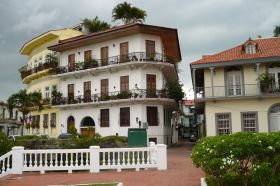 Describing the rules of etiquette or customs in Panama is pretty tough. There are rules of etiquette in Panama but they are pretty much in the grey area. They exist, but are not really followed because there is not really etiquette around anything. It’s completely the opposite situation than what you’re probably used to if you’re coming from the States or Canada.
Describing the rules of etiquette or customs in Panama is pretty tough. There are rules of etiquette in Panama but they are pretty much in the grey area. They exist, but are not really followed because there is not really etiquette around anything. It’s completely the opposite situation than what you’re probably used to if you’re coming from the States or Canada. The rules...
 Describing the rules of etiquette or customs in Panama is pretty tough. There are rules of etiquette in Panama but they are pretty much in the grey area. They exist, but are not really followed because there is not really etiquette around anything. It’s completely the opposite situation than what you’re probably used to if you’re coming from the States or Canada.
Describing the rules of etiquette or customs in Panama is pretty tough. There are rules of etiquette in Panama but they are pretty much in the grey area. They exist, but are not really followed because there is not really etiquette around anything. It’s completely the opposite situation than what you’re probably used to if you’re coming from the States or Canada. The rules of etiquette depends on situations. Obviously, there is a line at the bank but that’s about the only place where people are going to form a line. Any place other than that is a free for all. Driving and merging in an orderly fasion is not something that is done in Panama. Driving here is basically just push and fight. It’s just different from what North Americans are used to. It is not like one car goes on the left and one goes on the right and you simply merge. Rather, it’s like everybody wants to go first.
Common courtesy should cover any of your concerns on whether you might offend or insult someone in Panama or not. You don’t necessarily have to be aware about any customs. Yes, Panamanians might be more sensitive than someone from New York City or somewhere else where people just have a much thicker skin but it’s basically a very simple solution. Just be a decent person and you’ll be fine.
(Pictured is an older, restored area of Panama City, Panama)
Posted May 24, 2015
T Rob Brown - Panama Helpline
One point few people mention, but I think it is important is a style issue: often we North Americans get right to the point when asking for something. I have heard explanations that sometimes people feel they want to get to the point - they don't want to waste anyone's time.
In Panama - who you know is more important than money - and family is very important part of Panamanian life. Instead of what can be seen as bulldozing...
One point few people mention, but I think it is important is a style issue: often we North Americans get right to the point when asking for something. I have heard explanations that sometimes people feel they want to get to the point - they don't want to waste anyone's time.
In Panama - who you know is more important than money - and family is very important part of Panamanian life. Instead of what can be seen as bulldozing your way in, saying "I need..." try getting to know the person, find out about their family, their health - take the time - it will pay off in dividends you can't begin to imagine. Its another great reason to learn a little Spanish.
BTW - this is the way your grandfather did business - it's all about personal relationships.
Posted May 24, 2015
MANUEL GRANADOS - MEDICAL SERVICE PANAMA, S.A. (MS PANAMA, S.A.)
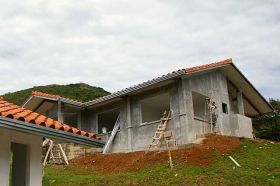 If you are from the US or other First World place where you have a culture of efficiency, you have to be what you would consider to be very patient with people here in Panama, especially when you are building a house or something like that. If you are patient, then you will get along.
If you are from the US or other First World place where you have a culture of efficiency, you have to be what you would consider to be very patient with people here in Panama, especially when you are building a house or something like that. If you are patient, then you will get along. Try to accept the fact that you are no longer living in the United States and that the culture and the importance of efficiency is different here in Panama.
...
 If you are from the US or other First World place where you have a culture of efficiency, you have to be what you would consider to be very patient with people here in Panama, especially when you are building a house or something like that. If you are patient, then you will get along.
If you are from the US or other First World place where you have a culture of efficiency, you have to be what you would consider to be very patient with people here in Panama, especially when you are building a house or something like that. If you are patient, then you will get along. Try to accept the fact that you are no longer living in the United States and that the culture and the importance of efficiency is different here in Panama.
(Pictured: a home being built in Panama.)
Posted June 8, 2015
David Bayliss - KW PACIFICA
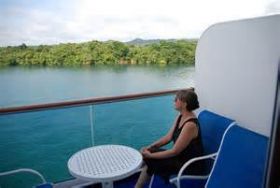 Among the rules of etiquette in Panama you should be aware of is that Latin people don’t want to see people on the side of the road with their shirt off, which they find offensive. If you’re walking around without a shirt and you’re a guy, they can actually give you a ticket for that.
Among the rules of etiquette in Panama you should be aware of is that Latin people don’t want to see people on the side of the road with their shirt off, which they find offensive. If you’re walking around without a shirt and you’re a guy, they can actually give you a ticket for that. The average person goes to dinner in Panama later and they stay out later in Latin America. It’s not an etiquette thing but the etiquette...
 Among the rules of etiquette in Panama you should be aware of is that Latin people don’t want to see people on the side of the road with their shirt off, which they find offensive. If you’re walking around without a shirt and you’re a guy, they can actually give you a ticket for that.
Among the rules of etiquette in Panama you should be aware of is that Latin people don’t want to see people on the side of the road with their shirt off, which they find offensive. If you’re walking around without a shirt and you’re a guy, they can actually give you a ticket for that. The average person goes to dinner in Panama later and they stay out later in Latin America. It’s not an etiquette thing but the etiquette comes in if someone seems loud when it’s 11 PM and you think it’s time to go to bed. However, 11 PM is not considered late in Panama or in Mexico. So we expats have to adjust to their thought process of them not being obnoxious for their being loud in their balcony while talking at 11 PM. They are still awake. That is just part of the nature of Latin America.
Waitresses typically do not walk over to bother you. That is how they are trained. So we think we are being ignored when in fact, our job is to look at the waitress and indicate that she should come over to approach the table because doing that by herself in their minds would be bad etiquette. Yet we expats want service but we didn’t know that we need to ask for it or to indicate that they should come over and so that is an etiquette situation that in our etiquette, we get mad because they wouldn’t come over to our table while they don’t want to offend us by coming over and bothering us.
Panamanians can drive real close to you but they are not trying to offend you. If you are merging onto a highway on a one-lane road that is wide enough for two cars, then Panamanian logic says, “Let’s put two cars in that spot.” Your job is to not overreact.
Panamanian police love driving with their emergency lights on. If you’re driving down the road and they are behind you, do not pull over until they ask you to. They are probably not trying to get your attention. They just drive that way! I tell that to other people and they say, “Oh my god, the cop was behind me and I got oh so scared but nothing happened!”
(Pictured: overlooking the shore at Lake Gatun, Panama.)
Posted May 29, 2016
Mike Vuytowecz - Inside Panama Real Estate
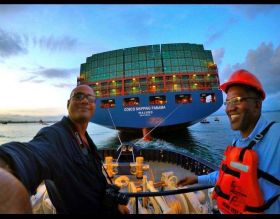 I don’t think the rules of etiquette in Panama are different from the how it is anywhere else. People tend to be the same no matter where you are. They are looking for respect and of course, since we are in their country it is reasonable for us to yield to them. We should learn to speak their language, embrace their culture, etc. Since you’re not in the United States, you adapt wherever you are.
I don’t think the rules of etiquette in Panama are different from the how it is anywhere else. People tend to be the same no matter where you are. They are looking for respect and of course, since we are in their country it is reasonable for us to yield to them. We should learn to speak their language, embrace their culture, etc. Since you’re not in the United States, you adapt wherever you are. I think that we Americans in particular,...
 I don’t think the rules of etiquette in Panama are different from the how it is anywhere else. People tend to be the same no matter where you are. They are looking for respect and of course, since we are in their country it is reasonable for us to yield to them. We should learn to speak their language, embrace their culture, etc. Since you’re not in the United States, you adapt wherever you are.
I don’t think the rules of etiquette in Panama are different from the how it is anywhere else. People tend to be the same no matter where you are. They are looking for respect and of course, since we are in their country it is reasonable for us to yield to them. We should learn to speak their language, embrace their culture, etc. Since you’re not in the United States, you adapt wherever you are. I think that we Americans in particular, when things are different from what we are used to, tend to think others are less intelligent than us when they act in a way we’re unaccustomed to because we don’t understand. The common mistake is not to be patient and understanding of the people who are in the country that’s hosting us. A big mistake and a big faux pas would be to be critical and impatient with Panamanians and Panamanian culture, which is definitely much more laid back and slower paced than what we are accustomed to. Many expats get frustrated with that. I find that if you’re a type A, and you’re in a great big hurry all the time, and everything has to be perfect, you either have to make an adjustment to your thought process or perhaps you’d be angry and disappointed all the time. If don’t adapt then you won’t be happy. You’ll always be upset. There are many people who come here who are always angry. They say Panamanians are stupid, this is stupid, that’s stupid, and why do they do it this way, etc. Those people don’t last very long.
(Panama Canal engineer and marine, Panama,pictured.)
Posted August 9, 2016
Daryl Ries - Keller Williams Panama, associate
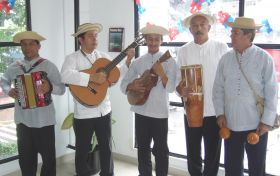 Panama City is a fast paced metropolis with a slow pace of life. In other words, the ‘mañana’ ethos is still alive in Panama and more so the further you get from the city. This is one of the wonders of Panama; a modern society still fixed in an old culture.
Panama City is a fast paced metropolis with a slow pace of life. In other words, the ‘mañana’ ethos is still alive in Panama and more so the further you get from the city. This is one of the wonders of Panama; a modern society still fixed in an old culture. Whenever you’re entering another country or entering a new culture there are somewhat different social expectations. Panama is a traditional country. Certain traditional...
 Panama City is a fast paced metropolis with a slow pace of life. In other words, the ‘mañana’ ethos is still alive in Panama and more so the further you get from the city. This is one of the wonders of Panama; a modern society still fixed in an old culture.
Panama City is a fast paced metropolis with a slow pace of life. In other words, the ‘mañana’ ethos is still alive in Panama and more so the further you get from the city. This is one of the wonders of Panama; a modern society still fixed in an old culture. Whenever you’re entering another country or entering a new culture there are somewhat different social expectations. Panama is a traditional country. Certain traditional social order exists here and as a result, you might need to be more aware of your ‘presentation’. Neatness and cordiality are primary, and always be prepared to say ‘please’ and ‘thank you’ in Spanish best. The amenities of social behavior are important, not only because it’s a traditional society but also because you are a foreigner and therefore not on lax terms with most local people you meet recently. You’re not part of their family, friends or clan. You are introducing yourself and it will take awhile before you might achieve a closer level of camaraderie and there’s a certain restraint. We should be aware of practicing that anywhere but particularly in another culture that is traditional.
As Americans tend to be less traditional, often Panamanians will give you leeway and make excuses for themselves by saying, “Well, we know that you don’t do this in the States.” In situations like this you can put them at ease as it might be a pleasure for you to be in a situation where you are observing and you are maybe remembering, if you are as old as I, that kind of tradition is the way our grandparents and families lived. There’s a certain traditional element that requires a level of respect and awareness. Of course many Panamanians have resided in the States, and they are totally aware of the contrasts.
In the long run it’s good to be aware of where tradition is at in a Latin American country such as Panama. Unless you are with your own peers or your own countrymen or other Westerners, be observant about the culture. For instance, going to any public office, do not go in casually dressed. They expect you to be very properly and cleanly dressed and to show a level of respect. It’s absolutely unacceptable to wear sunglasses or beach hats or flip flops, shorts and sleeveless shirts. If you’re doing business in a government office etc., even if it’s in a small town, for example, for car registration.
Panama is also, as true of Latin culture, strongly religious. The level of religious association and level of attention to it is extremely important. Religious adherence tends to be Orthodox, whether Catholic or Jewish, the two primary religions there. It is something I have learned to observe and respect, making an effort to behave in a more traditional fashion when I seek inclusion.
The traditional adherence is necessary to better condition yourself for life in Panama.
(Traditional Panama musicians, Panama, pictured.)
Posted October 5, 2016
David Btesh - Pacific Realty / Pacific Developers
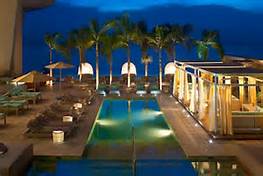 The etiquette in Panama is more like being in the beach. In Panama, dinner is not formal. The weather is always 80 degrees, and it goes up and down a few points in the night. The people wear jeans and sweaters, and if you go to a more formal place, you may wear a sports jacket. You need one in casinos. You see a lot of people in shorts during the day, while the girls also have those short pants. They also wear the formal suits, but the normal people don’t wear suits around the...
The etiquette in Panama is more like being in the beach. In Panama, dinner is not formal. The weather is always 80 degrees, and it goes up and down a few points in the night. The people wear jeans and sweaters, and if you go to a more formal place, you may wear a sports jacket. You need one in casinos. You see a lot of people in shorts during the day, while the girls also have those short pants. They also wear the formal suits, but the normal people don’t wear suits around the... The etiquette in Panama is more like being in the beach. In Panama, dinner is not formal. The weather is always 80 degrees, and it goes up and down a few points in the night. The people wear jeans and sweaters, and if you go to a more formal place, you may wear a sports jacket. You need one in casinos. You see a lot of people in shorts during the day, while the girls also have those short pants. They also wear the formal suits, but the normal people don’t wear suits around the city in daytime, unless you’re a banker or a lawyer.
The etiquette in Panama is more like being in the beach. In Panama, dinner is not formal. The weather is always 80 degrees, and it goes up and down a few points in the night. The people wear jeans and sweaters, and if you go to a more formal place, you may wear a sports jacket. You need one in casinos. You see a lot of people in shorts during the day, while the girls also have those short pants. They also wear the formal suits, but the normal people don’t wear suits around the city in daytime, unless you’re a banker or a lawyer. The customs in Panama and in the United States are a hundred percent the same. Remember that the Americans, were here from 1903, while they lived here until 1999, when they gave us back the Panama Canal, but there are still a lot of them, and everybody speaks English.
The banks in Panama are totally Americanized, and now we’re getting a lot of European banks in. That may change a little bit, but customs in Panama are the same as the United States. Your ordering in a restaurant is the same, as well as your checking in and out of hotels. We have a lot of European hotels now, and ones from South America.
Any of your credit cards are good all around. You’re dealing in dollars, and I don’t see much difference.
(Trump Ocean Club, Panama City, Panama, pictured.)
Posted November 9, 2016
Ron Hunter - Finca Cazador
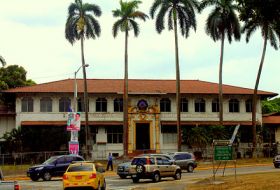 The Latino culture here in Panama and in general is typically very polite. For example, if you and I were in a theater and I wanted to walk between your knees and the seat in front of you, I would be using the phrase, “Su permiso,” which means “With your permission, may I pass in front of you?”
The Latino culture here in Panama and in general is typically very polite. For example, if you and I were in a theater and I wanted to walk between your knees and the seat in front of you, I would be using the phrase, “Su permiso,” which means “With your permission, may I pass in front of you?” Another example is when people get onto a bus or on any form of public transportation, they will look at everyone and say...
 The Latino culture here in Panama and in general is typically very polite. For example, if you and I were in a theater and I wanted to walk between your knees and the seat in front of you, I would be using the phrase, “Su permiso,” which means “With your permission, may I pass in front of you?”
The Latino culture here in Panama and in general is typically very polite. For example, if you and I were in a theater and I wanted to walk between your knees and the seat in front of you, I would be using the phrase, “Su permiso,” which means “With your permission, may I pass in front of you?” Another example is when people get onto a bus or on any form of public transportation, they will look at everyone and say “Buenos días” to everyone. Panamanians are very amiable and very polite.
The Spanish language as a whole isn’t offensive or direct, unlike how English can be. English is great for math and businesses, but some people in other parts of the world are almost offensively direct.
Spanish isn’t that way. Spanish goes up around the bend and out the back door. People here in Panama will typically never tell you anything you don’t want to hear, and that is something I don’t really like. The Panamanian culture is a culture of non-offense.
Here in Panama, when somebody comes to your property, it’s considered very offensive to walk up to the door. You have to stand on the road or at the yard and say, “Hola! Hola!” to get permission to enter into the yard.
The rural culture that came out of the ghettos of East L.A. is a culture that is seen throughout the world. When I was in Eastern Europe, I could see that culture there. It’s what you and I call the culture of rap, or the gangster mentality, and it’s here in Panama. It’s everywhere in the world and it’s a very loud, abrasive, in-your-face type of culture typically involving younger people with loud music that I don’t resonate with. It’s something that’s come in the last 10 or 15 years through music.
By American standards, the driving of Panamanians is aggressive. They use the horn too much, but it’s because there are too many people. Their traffic flow is superior to ours in the United States because they’re always inching forward, and when you have a lot of cars in a small space, nothing moves forward if everybody waits for everybody else.
In general, Panamanians don’t stand in lines well. They don’t get the concept that you take your turn. It’s really a mixed bag: on one side they’re very, very polite and almost non-contact, and on the other side, it’s what you and I take for granted coming out of our culture, like the distance and space. People get closer to each other and talk louder than what normally you and I would see in the United States. It’s cultural difference.
(Former YMCA Panama Canal Zone, Panama, pictured.)
Posted April 30, 2017


